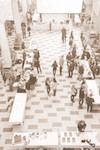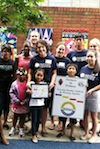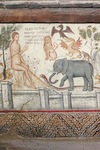 Though it shook her, Una loved the book. In fact she turned around and read it again straight through. I wanted to ask about it, but tried to give her space. I wondered how she experienced the story; I wondered at the contours of her approach toward, and immersion in, this particular encounter—with the characters, the tragedy, and ultimately with her own mortality.
Though it shook her, Una loved the book. In fact she turned around and read it again straight through. I wanted to ask about it, but tried to give her space. I wondered how she experienced the story; I wondered at the contours of her approach toward, and immersion in, this particular encounter—with the characters, the tragedy, and ultimately with her own mortality.
 When I sat down last Friday night, I expected to hear an essay — fresh, different, perhaps unpublished — on one of his go-to topics, whether the environment, social justice concerns, or some other aspect of intentional living. Since the day I’d booked him, I’d been waiting for the moment when he’d take the stage and begin reading — his deeply rooted ethos already apparent, piercing — and then I would steal glances around the room to see the shock of recognition on the faces of my students, see the visible signs of narrative transport taking them to a new place with a master at the helm.
When I sat down last Friday night, I expected to hear an essay — fresh, different, perhaps unpublished — on one of his go-to topics, whether the environment, social justice concerns, or some other aspect of intentional living. Since the day I’d booked him, I’d been waiting for the moment when he’d take the stage and begin reading — his deeply rooted ethos already apparent, piercing — and then I would steal glances around the room to see the shock of recognition on the faces of my students, see the visible signs of narrative transport taking them to a new place with a master at the helm.
But something else happened. Not something bad, not less than . . . just different.
 yet we have in our soil
yet we have in our soil
an inexhaustible mine
of true wealth,
the foundation of a nation’s
greatness,
 Anyone who’s ever kept a journal — whether for brief reflections or recording prayers and petitions — can attest to writing as a powerful form of thinking, perhaps the most powerful. Even a very basic written account can provide order in a chaotic area, a structure when there seems to be little or none. Journaling helps move us toward greater internal clarity, cutting through the smokescreens of confusion or the ego. We may spot unhealthy patterns in our lives that we’ve blocked out, consciously or otherwise. Or we might work through a period of suffering in writing that spurs us toward the growth of the soul and invites us to live more fully — as Sarton puts it, moving “toward what we will become from where we are.”
Anyone who’s ever kept a journal — whether for brief reflections or recording prayers and petitions — can attest to writing as a powerful form of thinking, perhaps the most powerful. Even a very basic written account can provide order in a chaotic area, a structure when there seems to be little or none. Journaling helps move us toward greater internal clarity, cutting through the smokescreens of confusion or the ego. We may spot unhealthy patterns in our lives that we’ve blocked out, consciously or otherwise. Or we might work through a period of suffering in writing that spurs us toward the growth of the soul and invites us to live more fully — as Sarton puts it, moving “toward what we will become from where we are.”  Artists and gardeners aren't the only ones who should be creating or coaxing life. I've started six urban gardens in three different cities and I can't stress how essential it is to co-create with those whom you want to build bonds. It is incarnational and it is transformational. It works across languages and ages. Three sunflower seeds can be enough. A tomato plant is even better. A public art project is outstanding.
Artists and gardeners aren't the only ones who should be creating or coaxing life. I've started six urban gardens in three different cities and I can't stress how essential it is to co-create with those whom you want to build bonds. It is incarnational and it is transformational. It works across languages and ages. Three sunflower seeds can be enough. A tomato plant is even better. A public art project is outstanding.
 Each of us recites a poem. We talk about current events, and tell stories from our personal journeys. The sound of crickets is broken by the bell tolling for Compline. We realize we’ve lost track of time, so we rush Brother Paul back to the Abbey for the service.
Each of us recites a poem. We talk about current events, and tell stories from our personal journeys. The sound of crickets is broken by the bell tolling for Compline. We realize we’ve lost track of time, so we rush Brother Paul back to the Abbey for the service.
Later, I will recall the blend of bread and wine and storytelling with prayer and the observing of silence. The rhythm of the afternoon, I think, might be a good model for the cadence of Antler’s work.
 Name is related to identity, and identity comes in part from story. When I learned more of our stories, I could see my family and myself in a new, larger context; I could enter into relationship — into community — with both the quick and the dead; I could inhabit a richer understanding of what community means. I could even “burst into poetry” and celebrate my heritage, my name.
Name is related to identity, and identity comes in part from story. When I learned more of our stories, I could see my family and myself in a new, larger context; I could enter into relationship — into community — with both the quick and the dead; I could inhabit a richer understanding of what community means. I could even “burst into poetry” and celebrate my heritage, my name. The kneeling me looks like
The kneeling me looks likea man who has kept to himself
for too long upon learning
he had been fooled by a grand idea.
He repents only in the face of death.
The dead me is white as an angel,
young and crowned with seaweed.
 The distraction helps me forget the silver eyebrow, wayward twin of Normal. But I return to my departing gate and the young man remains where I left him. I cannot shake his innocuous but jarring irregularity, a feature allowing his face to hold the paradox of innocence and experience together in tension. Somehow he stands between the woman with the cane for whom the airport is a veritable gauntlet, and the young couple who could circumnavigate it all day and get up tomorrow to do it again. He wears on the outside what we get to hide from, put off, or ignore: our own slow march toward greater imperfection, and then, the end. It’s not about age; it’s about control.
The distraction helps me forget the silver eyebrow, wayward twin of Normal. But I return to my departing gate and the young man remains where I left him. I cannot shake his innocuous but jarring irregularity, a feature allowing his face to hold the paradox of innocence and experience together in tension. Somehow he stands between the woman with the cane for whom the airport is a veritable gauntlet, and the young couple who could circumnavigate it all day and get up tomorrow to do it again. He wears on the outside what we get to hide from, put off, or ignore: our own slow march toward greater imperfection, and then, the end. It’s not about age; it’s about control.













